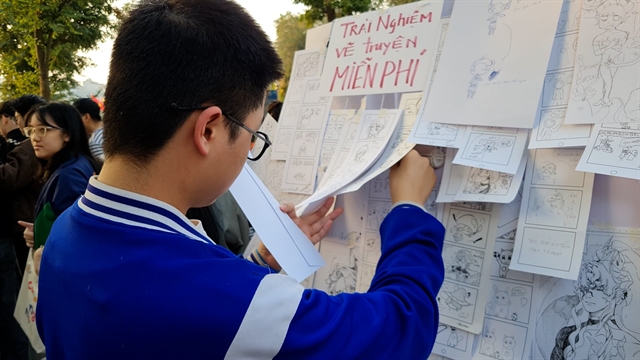 Society
Society


|
| A screenshot of Miss Grand International 2021 Nguyễn Thúc Thùy Tiên, 27, from HCM City, during a livestream on social media to promote the Kera candy product. — VNS Photo Bồ Xuân Hiệp |
HCM CITY — A Vietnamese beauty queen has been banned from leaving the country due to her alleged involvement in fraud related to the “manufacturing and trading of counterfeit food or food additives” and “deceiving customers.”
Nguyễn Thúc Thùy Tiên, 27, from HCM City, will be prohibited from international travel until May 15 as confirmed by the Đắk Lắk Provincial Police.
In addition, she has been fined VNĐ25 million (US$980) for misleading customers by advertising a candy as a fibre-rich supplement.
Last Friday, five individuals, including two popular Vietnamese KOLs, were arrested for allegedly misleading consumers by promoting a candy product as a fibre-rich supplement.
Phạm Quang Linh, known as Quang Linh Vlogs and a member of the board of directors at Chị Em Rọt (CER) Group Joint Stock Company, and Nguyễn Thị Thái Hằng, known as Hằng Du Mục, chairwoman of Chị Em Rọt, are facing charges related to the “manufacturing and trading of counterfeit food or food additives” and “deceiving customers,” according to the police.
The other three individuals are Nguyễn Phong, chairman of Asia Life JSC; Lê Tuấn Linh, director and legal representative of Chị Em Rọt Group JSC; and Lê Thành Công, also a board member of Chị Em Rọt.
Prior to their arrests, Hằng Du Mục, Quang Linh Vlogs, and Tiên had promoted the Kera vegetable candy product through livestreams on social media, claiming it could serve as a substitute for vegetables.
The product, launched late last year by CER Group in HCM City, was manufactured by Asia Life JSC in the Central Highlands province of Đắk Lắk.
Lê Tuấn Linh, CEO of CER, had previously asserted that all ingredients were sourced locally, ensuring high quality and clear origins.
However, the assertions made by influencers Linh, Hằng, and Tiên that “one candy replaces a plate of vegetables” were found to be false.
Tests conducted by authorities revealed that each box of 30 candies contained only 0.51 grams of fibre, which is significantly lower than the claims made in advertisements.
Before their arrests, both Linh and Hằng had also been penalised with fines of VNĐ70 million ($2,720) each for violations in advertising practices, and they were required to issue corrections regarding their misleading claims.
The company had already sold over 100,000 boxes of the product, pledging to provide refunds to customers. Each box, containing 30 candies, was marketed at prices ranging from VNĐ150,000 to VNĐ165,000 across various online platforms.
The company has announced that it will refund customers who purchased the product.
In response to public backlash, the Ministry of Public Security had initiated the investigation and concluded that the false claims regarding the candy have significantly undermined consumer rights, prompting further inquiries into additional violations by the involved parties.
All influencers have publicly acknowledged their misleading claims and have apologised to the public.
Authorities have urged individuals and organisations who have acquired any of the Kera candy boxes to contact the Ministry’s Investigation Agency in Cầu Giấy District, Hà Nội, for guidance on legal recourse.
Experts have noted the rise of social media in recent years has blurred the lines between genuine expertise and self-promotion.
Influencers, many of whom lack professional qualifications, often gain public trust by portraying themselves as committed to charitable causes and acting as responsible brand ambassadors.
The situation has raised growing concerns regarding the influence of social media personalities and the potential risks associated with misleading advertising. — VNS